 |
South West USA | Part 2 |
Saturday 9 May 2015
We eat our breakfast, which we bought yesterday at the Safeway, in our room.
We go back to Safeway to drink coffee at Starbucks there.
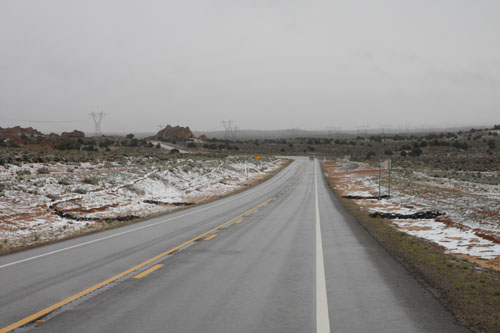 Next
we draw cash from the ATM. At half past nine we head for Grand Canyon. We
drive on US 89 through a desolate landscape. It's cold (4 degrees), but when
the road starts to climb, the temperature drops further still and it starts
to snow. The snow does not melt and before we know it, we are in the midst
of a winter landscape. We notice that we have only a quarter tank of gas.
Forgot to fill it up in Page. Fortunately, we have enough for 207km (we
still have 167km to to Grand Canyon) and according to our navigation device
we will see a gas station within half an hour. We fill up the tank at the
Gap Trading post. We arrive around 11 am at the entrance of the
Grand Canyon National Park
on the East Rim Drive. Our first stop is Desert View at the old viewing
tower, designed by Mary Jane Coulter in 1932. The view of the canyon is
probably beautiful, but it is partially obstructed by low hanging clouds.
The colors, combined with the mist are quite special. It is stone cold too
and it starts snowing quite heavily. The temperature drops to freezing.
Because of the blizzard we drive straight to our hotel, which lies
Next
we draw cash from the ATM. At half past nine we head for Grand Canyon. We
drive on US 89 through a desolate landscape. It's cold (4 degrees), but when
the road starts to climb, the temperature drops further still and it starts
to snow. The snow does not melt and before we know it, we are in the midst
of a winter landscape. We notice that we have only a quarter tank of gas.
Forgot to fill it up in Page. Fortunately, we have enough for 207km (we
still have 167km to to Grand Canyon) and according to our navigation device
we will see a gas station within half an hour. We fill up the tank at the
Gap Trading post. We arrive around 11 am at the entrance of the
Grand Canyon National Park
on the East Rim Drive. Our first stop is Desert View at the old viewing
tower, designed by Mary Jane Coulter in 1932. The view of the canyon is
probably beautiful, but it is partially obstructed by low hanging clouds.
The colors, combined with the mist are quite special. It is stone cold too
and it starts snowing quite heavily. The temperature drops to freezing.
Because of the blizzard we drive straight to our hotel, which lies 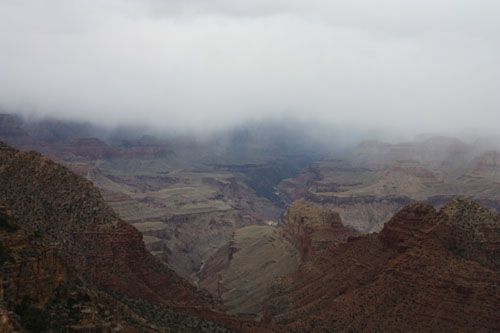 just
south of the National Park main entrance. It is the
Holiday Inn Express in Williams. We can immediately take up the
room. We eat at MacDonalds opposite the hotel, before we take a rest in the
room. Next plan is to drive along the Desert View Drive and enjoy the view
at Grandview Point. There's a dense fog, however, so thick that you can see
virtually nothing. We drive along the road back towards the village and see
that closer to the village the view on the Canyon is much better. On the way
we see groups of Elks grazing at the roadside and in the forest. They are
not bothered by human interest. We continue to Yavapai Point, next to the
geological museum. This seems a good place to photograph a sunset tonight.
The clouds may be a killjoy. We go back to the hotel. We eat at
We cook pizzas & pastas.
Not
just
south of the National Park main entrance. It is the
Holiday Inn Express in Williams. We can immediately take up the
room. We eat at MacDonalds opposite the hotel, before we take a rest in the
room. Next plan is to drive along the Desert View Drive and enjoy the view
at Grandview Point. There's a dense fog, however, so thick that you can see
virtually nothing. We drive along the road back towards the village and see
that closer to the village the view on the Canyon is much better. On the way
we see groups of Elks grazing at the roadside and in the forest. They are
not bothered by human interest. We continue to Yavapai Point, next to the
geological museum. This seems a good place to photograph a sunset tonight.
The clouds may be a killjoy. We go back to the hotel. We eat at
We cook pizzas & pastas.
Not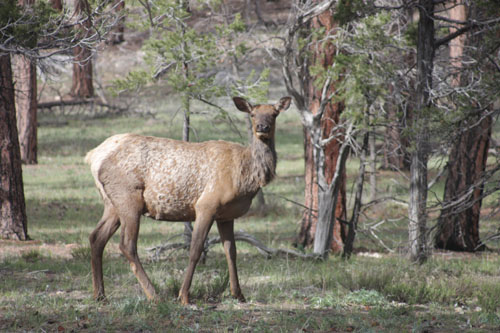 really fun, but functional and inexpensive. We pick up my camera and go back
to Yavapai. The air seems bleak, but it gets better. We decide to stay and
start a time-lapse recording.
really fun, but functional and inexpensive. We pick up my camera and go back
to Yavapai. The air seems bleak, but it gets better. We decide to stay and
start a time-lapse recording.
It is bitterly cold, but we persist. We'll get some questions from
passersby. We are the last to leave this spot after sunset, by which time it
is pitch dark.
The hotel has nothing going on. For drinks, we go to the Grand Hotel
opposite, which has a nice bar with some live music. We both order a
cocktail.
Weather: cold and snow. 0-4°C / 32-40°F
Zondag 10 May 2015
After breakfast at the hotel we have coffee at the RP Reststop. The sun is shining and we can sit outside. We drive to the Grand Canyon airport. We have booked a helicopter flight with Papillon. Upon arriving there, we are told that we are being upgraded to a flight with Grand Canyon Helicopters, a few hundred meters away. A fee of $ 50 per person extra will be charged if we can - if the weight distribution allows it - sit at the front of the helicopter, which can carry a total of six passengers. We are lucky and we sit next to the pilot - the $ 50 was never charged. We fly over a forest to the Canyon, which reveals itself only at the last moment. The view of the Canyon from the air is fantastic. We cross the Canyon and fly along the northern edge. We even get comment in Dutch on our headphones . We take lots of pictures and video, but do not forget to enjoy the flight. Underneath us you can see the Colorado River, which has caused natural beauty. The flight takes about 25 minutes.
After our return we enter the national park and rent a
bike at
Bright Angel near the
visitor center. We receive detailed instructions on the routes and the bikes
themselves, as if we do it for the first time. We drive westbound along the
rim in the direction of Hermit's Rest. We share t he
road with shuttle buses (private vehicles are not allowed here) and must
make way for passing busses. We drive to Hopi Point. From the Grand Canyon
Village to Hopi (2153m) is a 6% climb. In this thin air that is not as easy
as it sounds. The bikes are excellent: 21 gears
he
road with shuttle buses (private vehicles are not allowed here) and must
make way for passing busses. We drive to Hopi Point. From the Grand Canyon
Village to Hopi (2153m) is a 6% climb. In this thin air that is not as easy
as it sounds. The bikes are excellent: 21 gears 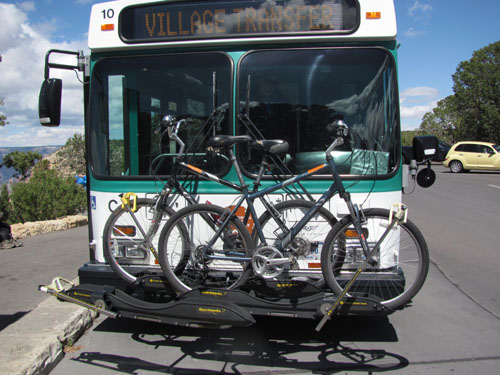 and
very light. Hopi Point is one of the most beautiful views on the western
part of the canyon. After Hopi the trail is more gentle and goes
slightly up and down. The weather is beautiful, the sun is shining, but it's
only 11 ° C. The sun rays are hot, but on the bike you feel the icy cold
wind. We stop a few times for viewing until we arrive at Hermit's
Rest at the end of the West Rim Drive. Here is a curio shop and a
snack bar in a buildin designed by Mary Jane
Colter in 1914. After a break we return by bus to Powell Point.
The buses have a rack at the front, on which up to 3 bicycles can be
carried. From Powell (2151m), the route is pretty fast descending 100 meters
down to the village. Then it's a few kilometers more on cycle paths through
the woods to the visitor center, where we drop off the bikes.
and
very light. Hopi Point is one of the most beautiful views on the western
part of the canyon. After Hopi the trail is more gentle and goes
slightly up and down. The weather is beautiful, the sun is shining, but it's
only 11 ° C. The sun rays are hot, but on the bike you feel the icy cold
wind. We stop a few times for viewing until we arrive at Hermit's
Rest at the end of the West Rim Drive. Here is a curio shop and a
snack bar in a buildin designed by Mary Jane
Colter in 1914. After a break we return by bus to Powell Point.
The buses have a rack at the front, on which up to 3 bicycles can be
carried. From Powell (2151m), the route is pretty fast descending 100 meters
down to the village. Then it's a few kilometers more on cycle paths through
the woods to the visitor center, where we drop off the bikes.
We drive back to the hotel. In the evening we have
dinner at the
Grand Hotel
across the road. The Canyon restaurant is All American in style and menu,
but tasty and portions are not too large. Erik takes a Jambalaya and I had a
grilled salmon. Later in the evening a country singer takes the stage.
Weather: sunny, 11-14° C / 52-57°F
Monday 11 May 2015
 An
ugly spread out village. It is the last village before Monument Valley.
Monument Valley
is located on the territory of the Navajo Nation. The landscape with the
big rock is famous for its many Holywood movies made here. Especially
the film
Stagecoach (1939) directed
An
ugly spread out village. It is the last village before Monument Valley.
Monument Valley
is located on the territory of the Navajo Nation. The landscape with the
big rock is famous for its many Holywood movies made here. Especially
the film
Stagecoach (1939) directed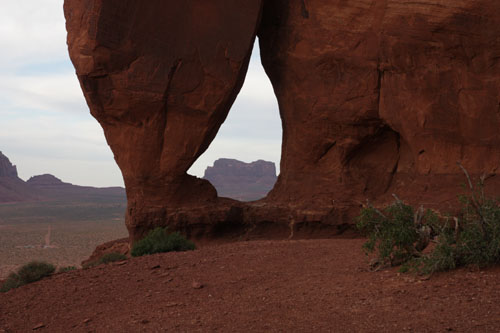 by John Glenn with John Wayne in the lead role (trailer)
determined the image that has been created for this region. The red
rocks are extremely large and impressive and seem to stabbing straight
up out of the ground. In reality, the plains have dropped by erosion and
only the hardest rocks stayed where they were. We stay at The View hotel
overlooking the Mittens, two large buttes, which resemble, with a bit of
imagination, mittens. Next to them is Merrick Butte. The hotel is
in the same color as the rocks around it, so from afar, it is barely
distinguishable.
by John Glenn with John Wayne in the lead role (trailer)
determined the image that has been created for this region. The red
rocks are extremely large and impressive and seem to stabbing straight
up out of the ground. In reality, the plains have dropped by erosion and
only the hardest rocks stayed where they were. We stay at The View hotel
overlooking the Mittens, two large buttes, which resemble, with a bit of
imagination, mittens. Next to them is Merrick Butte. The hotel is
in the same color as the rocks around it, so from afar, it is barely
distinguishable.
We have a break and have dinner at 5pm. Typical Navajo dishes are served
here, without alcohol. The Navojo's prohibit the sale of alcohol,
because of the serious alcohol problems that have been here and still
are. At 6pm we wait in the lobby for our guide from
Majestic Tours for the Sunse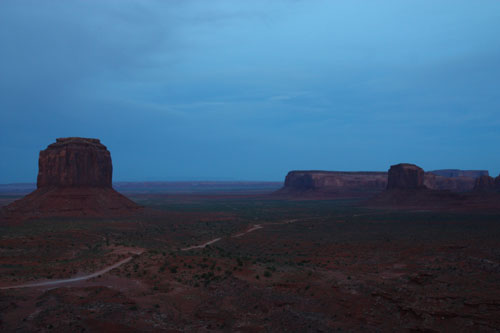 t
tour to Teardrop Rock. We ride on an open vehicle. We
catch the full wind, but fortunately it is not that cold yet. It is a
great tour for just the two of us. We pass Goldings Campground on our
way to the mountains and the Lost Arch. Next, we see the ruins of an
ancient settlement, that is difficult to get to. Through small gates you
can get there. The original inhabitants must have been very small. The
narrow passages were meant for defensive purposes against enemies. We
also get some nice views of the valley. Especially from the famous
Teardrop Rock, which is nice framework for the Mittens. The guide knows
a lot about the Navajo people and their culture and about the
vegetation. Despite the drought grow quite a few tough plants manage to
grow here. After 2.5 hours, the tour is finished and we are back at the
hotel.
t
tour to Teardrop Rock. We ride on an open vehicle. We
catch the full wind, but fortunately it is not that cold yet. It is a
great tour for just the two of us. We pass Goldings Campground on our
way to the mountains and the Lost Arch. Next, we see the ruins of an
ancient settlement, that is difficult to get to. Through small gates you
can get there. The original inhabitants must have been very small. The
narrow passages were meant for defensive purposes against enemies. We
also get some nice views of the valley. Especially from the famous
Teardrop Rock, which is nice framework for the Mittens. The guide knows
a lot about the Navajo people and their culture and about the
vegetation. Despite the drought grow quite a few tough plants manage to
grow here. After 2.5 hours, the tour is finished and we are back at the
hotel.
At night it is pitch dark outside. You do not see a thing
Weather: sunny, 20°C
Tuesday 12 May 2015
After breakfast at The View we wait for Charlene Johnston from
Dineh Behkayah Tours
for our 3.5 hour tour through Monument 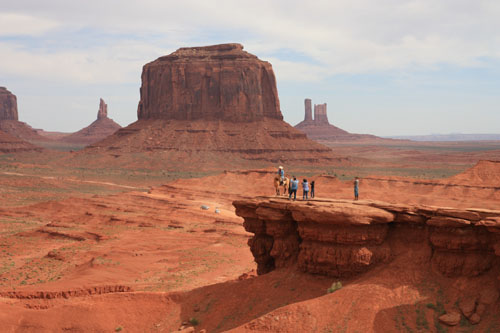 Valley.
Charlene collects the $180 and our driver is Matt, an elderly Navajo,
who has a bit of drawl, but knows where the good spots can be found in
the area. We start on the loop road that leads to John Ford point. Matt
gives us the names of various buttes, mesas and other mountainous
bodies. Monument Valley was once a flat landscape. During the millions
of years that followed a large part was worn away by water and wind
erosion, and just a few hard pieces were left standing, which is why the
buttes now dominate the landscape. They crumbles every now and then, but
not too often. The land is barren and dry. Sand and sandstone.
Nevertheless the sand retains much moisture and an underground water
flow runs through the area. The Valley - which is not really a valley -
became well known for the movies that were filmed here. One of the first
who discovered the area as a film set was the director John Ford
(1893-1973), who shot the film Stagecoach in 1939 starring John Wayne
and John Carradine in the lead r
Valley.
Charlene collects the $180 and our driver is Matt, an elderly Navajo,
who has a bit of drawl, but knows where the good spots can be found in
the area. We start on the loop road that leads to John Ford point. Matt
gives us the names of various buttes, mesas and other mountainous
bodies. Monument Valley was once a flat landscape. During the millions
of years that followed a large part was worn away by water and wind
erosion, and just a few hard pieces were left standing, which is why the
buttes now dominate the landscape. They crumbles every now and then, but
not too often. The land is barren and dry. Sand and sandstone.
Nevertheless the sand retains much moisture and an underground water
flow runs through the area. The Valley - which is not really a valley -
became well known for the movies that were filmed here. One of the first
who discovered the area as a film set was the director John Ford
(1893-1973), who shot the film Stagecoach in 1939 starring John Wayne
and John Carradine in the lead r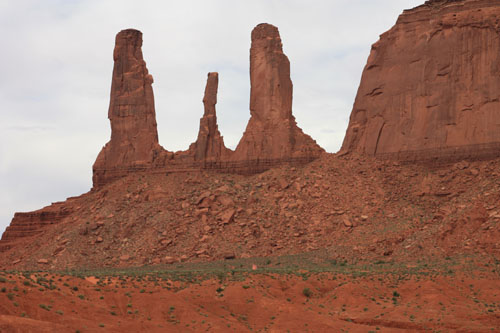 oles.
Many other films followed including the Searchers (also Ford, Thelma &
Louise, Forrest Gump, Back to the Future and The Lone Ranger. We pass
several beautiful rock formations. The best known are close to our
hotel: The Mittens and Merrick Butte. A little further we pass Elephant
Butte. The similarities to the things they are named after are sometimes
far-fetched. We also stop at John Ford's Point, which offers John Ford's
favorite views . Here are some shops with Navajo people selling their
crafts and offering the opportunity to be photographed riding a horse at
the viewpoint. A bit later we arrive at a Hogan, a Navajo hut in which
woman does her traditional weaving. The roof of the cabin is special. It
consists of stacked wooden poles and remains in place without the use of
any nails. Many people drive this track with their normal car, but
oles.
Many other films followed including the Searchers (also Ford, Thelma &
Louise, Forrest Gump, Back to the Future and The Lone Ranger. We pass
several beautiful rock formations. The best known are close to our
hotel: The Mittens and Merrick Butte. A little further we pass Elephant
Butte. The similarities to the things they are named after are sometimes
far-fetched. We also stop at John Ford's Point, which offers John Ford's
favorite views . Here are some shops with Navajo people selling their
crafts and offering the opportunity to be photographed riding a horse at
the viewpoint. A bit later we arrive at a Hogan, a Navajo hut in which
woman does her traditional weaving. The roof of the cabin is special. It
consists of stacked wooden poles and remains in place without the use of
any nails. Many people drive this track with their normal car, but
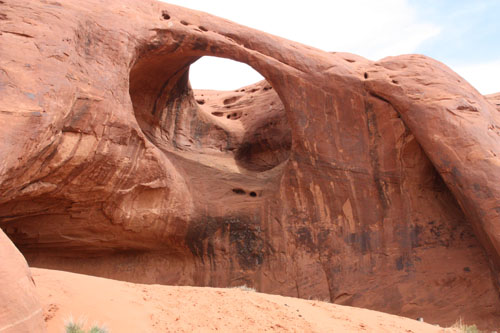 that's
not easy. The tours also go further - behind the scenes, so to speak -
where private cars are not allowed. So we follow bumpy and sandy tracks
to Sun's Eye (a hole in a mountain) and the Ear of the Wind. Here Matt
plays a piece on his Navajo flute. We also see a number of dunes and
even a water well, which is a favorite for the many free ranging horses.
There is a lot of alkaline in the water, so it is not suitable for human
consumption. We end the tour with a view of the Totem Pole and a view
from Artist Point.
that's
not easy. The tours also go further - behind the scenes, so to speak -
where private cars are not allowed. So we follow bumpy and sandy tracks
to Sun's Eye (a hole in a mountain) and the Ear of the Wind. Here Matt
plays a piece on his Navajo flute. We also see a number of dunes and
even a water well, which is a favorite for the many free ranging horses.
There is a lot of alkaline in the water, so it is not suitable for human
consumption. We end the tour with a view of the Totem Pole and a view
from Artist Point.
After the tour we have lunch at the restaurant. The portion of my Navajo
Burger is so generous that there is enough left for dinner. We the
friendly staff bring us a box to pack it. The afternoon we spend doing
very little. We buy something in the gift shop and enjoy the view. In
the evening we eat the rest of our lunch on our private balcony and
watch TV.
Weather: sunny, 20 ° C / 68° F
Woensdag 13 May 2015
We drive following the US 163, 191 and 160 to the Four
Corners monument. This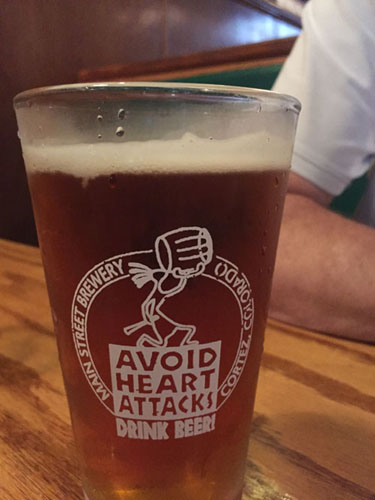 monument, located in the Navajo Nation marks the only place in the US where
four states meet. Here Utah, Arizona, New Mexico and Colorado share a
border. The monument does look nice, but otherwise there is, besides a large
number of sellers of Indian handicraft, nothing to do. After a cup of
mediocre coffee we drive to Cortez (Colorado), where we arrive at half past
twelve at the
Retro Inn. The clock
is set an hour ahead again, because Colorado does observe daylight saving
time. It is a nice motel in retro style. Before the room is ready we have
lunch at Once Upon a
Sandwich in the town center. Cortez is not a very interesting
town. It is a strechted out village with an abundance of middle class
motels. The location near the Mesa Verde is its only claim to fame. In the
afternoon, we get some information on the Mesa Verde in Colorado Visitor
Center. It turns out that a number of the sites in the park that we wanted
to visit do not open until May 22. The only one we can visit, the Balcony
House, seems far too strenuous for our constitution: climbing ladders and
crawling through narrow tunnels. We can go there and view a number of
locations from outside and visit one with a self guided tour. The Colorado
air is thinner than we are used to. The smalles effort makes you feel as if
you can not breathe enough. It is supposed to take four days to get used to
the high altitude.
monument, located in the Navajo Nation marks the only place in the US where
four states meet. Here Utah, Arizona, New Mexico and Colorado share a
border. The monument does look nice, but otherwise there is, besides a large
number of sellers of Indian handicraft, nothing to do. After a cup of
mediocre coffee we drive to Cortez (Colorado), where we arrive at half past
twelve at the
Retro Inn. The clock
is set an hour ahead again, because Colorado does observe daylight saving
time. It is a nice motel in retro style. Before the room is ready we have
lunch at Once Upon a
Sandwich in the town center. Cortez is not a very interesting
town. It is a strechted out village with an abundance of middle class
motels. The location near the Mesa Verde is its only claim to fame. In the
afternoon, we get some information on the Mesa Verde in Colorado Visitor
Center. It turns out that a number of the sites in the park that we wanted
to visit do not open until May 22. The only one we can visit, the Balcony
House, seems far too strenuous for our constitution: climbing ladders and
crawling through narrow tunnels. We can go there and view a number of
locations from outside and visit one with a self guided tour. The Colorado
air is thinner than we are used to. The smalles effort makes you feel as if
you can not breathe enough. It is supposed to take four days to get used to
the high altitude.
We drink coffee in the
San Juan Coffee Co on E Main Street. Then we do some shopping at
Safeway and Walmart. They are gigantic stores with wide range of items. At
night we have dinner at the Main Street
Brewery. Tasty food and a wide choice of self-brewed beers in the
restaurant.
Thursday 14 May 2015
The 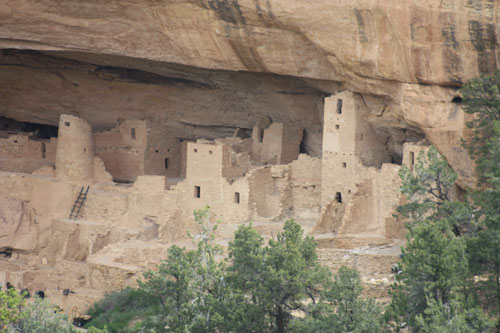 Retro
Inn serves a small breakfast at the reception. There is bread, cereals,
jams, eggs and fruit. After breakfast drive to
Mesa Verde National Park.
The national park is about 10 miles east of Cortez. It is still chilly
and there is a lot of wind. We start at the visitor center to get some
orientation on the National Park. It is the only National Park which is
founded exclusively on the basis of its archaeological and
cultural-historic value. The Mesa Grande is a plateau, which got its
name from Spanish explorers, who called it a Green Table. Actually it is
not Mesa, but one Cuesta, because the top is not flat but 7% slope.
Since there are a lot of those in the Southwest of the US, that's not so
special. On the sides of the Mesa Verde Ancestral Pueblo Indians,
previously also called Anasazi built cave dwellings on ledges . Cool in
summer and sheltered from the cold winds in the winter, they were easy
to defend against hostile nations. The Pueblo lived here in the 13th
century, but around 1275 they disappeared and nobody knows exactly why
and where to. In the 13th century the population in this region
was higher than today.
Retro
Inn serves a small breakfast at the reception. There is bread, cereals,
jams, eggs and fruit. After breakfast drive to
Mesa Verde National Park.
The national park is about 10 miles east of Cortez. It is still chilly
and there is a lot of wind. We start at the visitor center to get some
orientation on the National Park. It is the only National Park which is
founded exclusively on the basis of its archaeological and
cultural-historic value. The Mesa Grande is a plateau, which got its
name from Spanish explorers, who called it a Green Table. Actually it is
not Mesa, but one Cuesta, because the top is not flat but 7% slope.
Since there are a lot of those in the Southwest of the US, that's not so
special. On the sides of the Mesa Verde Ancestral Pueblo Indians,
previously also called Anasazi built cave dwellings on ledges . Cool in
summer and sheltered from the cold winds in the winter, they were easy
to defend against hostile nations. The Pueblo lived here in the 13th
century, but around 1275 they disappeared and nobody knows exactly why
and where to. In the 13th century the population in this region
was higher than today.
The entrance to the park is just off the US 160, but from there it is 23
mile drive to the dwellings. The first complex that we visit - after
enjoying some views - is Spruce House. From the museum there is a path
several hundred feet down to the houses. W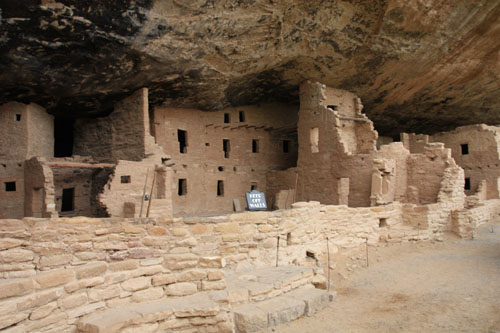 e
can view them from the outside. There is a ladder that allows you to
reach an underground round dwelling. It has a very simple round shape
with a fireplace. From Spruce Tree House we drive to Farview Point where
we have lunch in the cafeteria. Unfortunately the most famous settlement
called Cliff Palace cannot be visited before May 22. We therefore drive
to Sun Temple. This is a sun temple, which was never completed. Before
the Pueblos got round to complete it, they went away. The building is
fairly complex. Hence, one suspects that there has been cooperation with
groups from the region to build it. From Sun Temple we have a nice view
of Cliff Palace. From a distance we see how large and extensive a
complex it is, it seems to be glued to the mountain wall. We drive back
to Farview and then drive the Wetherill Mesa Road. This is another
branch of the Mesa Verde. At the end of that road are the Long House and
Step House. Both are unfortunately not open for visitors yet, so we made
the trip for nothing. It would have been useful to have some warning
beforehand. The Mesa Verde is chilly. It is around 11 degrees (52°F).
We're here at 5000 to 7000 feet altitude (1600 to 2600 meters) and the
strong wind makes it really cold.
e
can view them from the outside. There is a ladder that allows you to
reach an underground round dwelling. It has a very simple round shape
with a fireplace. From Spruce Tree House we drive to Farview Point where
we have lunch in the cafeteria. Unfortunately the most famous settlement
called Cliff Palace cannot be visited before May 22. We therefore drive
to Sun Temple. This is a sun temple, which was never completed. Before
the Pueblos got round to complete it, they went away. The building is
fairly complex. Hence, one suspects that there has been cooperation with
groups from the region to build it. From Sun Temple we have a nice view
of Cliff Palace. From a distance we see how large and extensive a
complex it is, it seems to be glued to the mountain wall. We drive back
to Farview and then drive the Wetherill Mesa Road. This is another
branch of the Mesa Verde. At the end of that road are the Long House and
Step House. Both are unfortunately not open for visitors yet, so we made
the trip for nothing. It would have been useful to have some warning
beforehand. The Mesa Verde is chilly. It is around 11 degrees (52°F).
We're here at 5000 to 7000 feet altitude (1600 to 2600 meters) and the
strong wind makes it really cold.
We drive back to Cortez. There it much warmer weather with sunshine and
22 ° C. We hang around a bit and get an evening meal at
Destination grill. Fine restaurant opposite our motel. Here we
get aquainted with the S'more dessert. It's grilled marshmallow with
chocolate on top. The name is a contraction of "some more" and the
dessert was created by the Boy Scouts in 1927.
Weather: Mesa Verde overcast, strong wind. 11°C / 52°F. Cortez sunny 22°
Vrijdag 15 May 2015
We have breakfas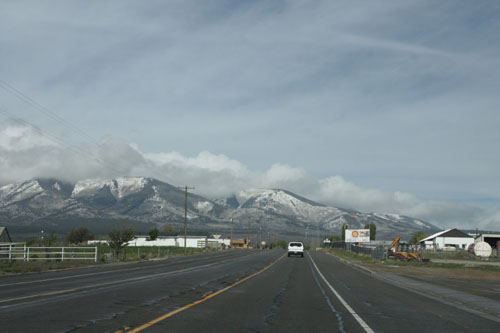 t
at the reception. Last night a thunderstorm raged through the area. This
morning it is still rainy. Before we leave Cortez we drink a cappuccino
at San Juan Coffee. We drive northbound on US 491 through a dull rural
landscape. Many farms with various crops and some livestock. When we get
near Monticello we get a view of the Abajo Mountains looming in the
distance with snow-capped peaks. We turn right here on the US191 to
Moab. We get to Moab around 11.30. We are far too early to check in at
the
Inca Inn motel. That is why we go to the
Moab Laundry Express to do
the laundry. The laundry is self service. The machines work with
quarters. Also, the washing powder is sold from a vending machine. You
can get the coins from a money change machine. A spin in a medium size
machine costs $ 4. For tumble drying another $1.50. The washing machine
programme is a lot shorter here than at home. In 24 minutes it's done.
Then we have lunch at the
Twisted Sistas Café.
An eatery under lesbian management with tasty salads. After
t
at the reception. Last night a thunderstorm raged through the area. This
morning it is still rainy. Before we leave Cortez we drink a cappuccino
at San Juan Coffee. We drive northbound on US 491 through a dull rural
landscape. Many farms with various crops and some livestock. When we get
near Monticello we get a view of the Abajo Mountains looming in the
distance with snow-capped peaks. We turn right here on the US191 to
Moab. We get to Moab around 11.30. We are far too early to check in at
the
Inca Inn motel. That is why we go to the
Moab Laundry Express to do
the laundry. The laundry is self service. The machines work with
quarters. Also, the washing powder is sold from a vending machine. You
can get the coins from a money change machine. A spin in a medium size
machine costs $ 4. For tumble drying another $1.50. The washing machine
programme is a lot shorter here than at home. In 24 minutes it's done.
Then we have lunch at the
Twisted Sistas Café.
An eatery under lesbian management with tasty salads. After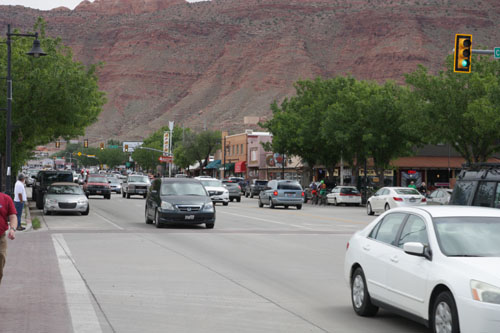 lunch we return to the motel. Our room is now ready. We have a small,
darkish room, but well furnished. We rest and go to the village at 3pm.
We have coffee at the
Moab Coffee roasters.
The coffee is roasted before our eyes. It takes a while to get your
coffee. Making coffee is taken very seriously here. After coffee we walk
on and arrive at the Eddie MCSTIFF Pub. Here we have a cocktail and a
locally brewed beer. It's raining heavily outside.
lunch we return to the motel. Our room is now ready. We have a small,
darkish room, but well furnished. We rest and go to the village at 3pm.
We have coffee at the
Moab Coffee roasters.
The coffee is roasted before our eyes. It takes a while to get your
coffee. Making coffee is taken very seriously here. After coffee we walk
on and arrive at the Eddie MCSTIFF Pub. Here we have a cocktail and a
locally brewed beer. It's raining heavily outside.
At night we eat at Sabaku Sushi. Great food, but not cheap. After dinner
another coffee at the Coffee Roaster before returning to the motel.
Weather: rain showers, 4°C/ 39°F (Cortez) to 14°C/57°F (Moab).
|
|
Other Travel |
|
| back | continue |